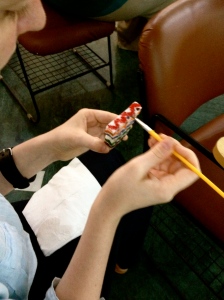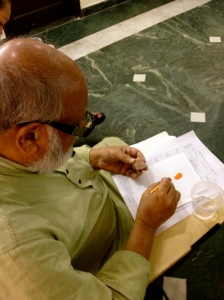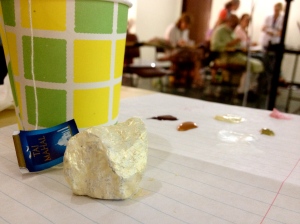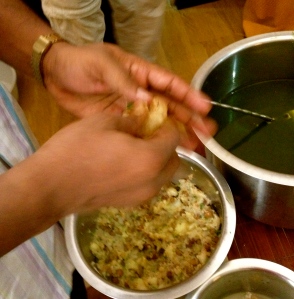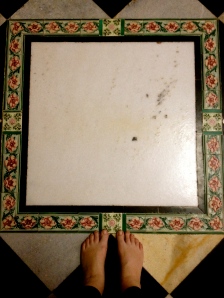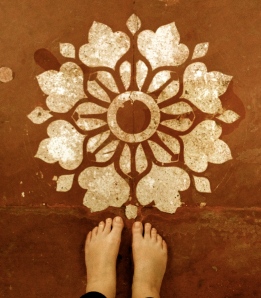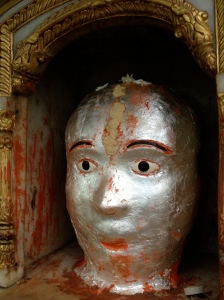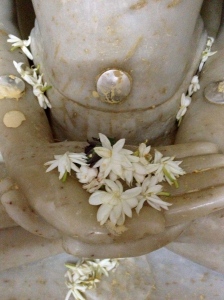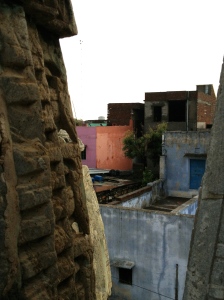I had e-mailed with some of them beforehand, or answered questions on Facebook. But really, they were strangers—13 other women, mostly from the US, mostly schoolteachers.
I had returned to Delhi on the night train from Varanasi; most of the scholars from the six week program had departed or were in the process of departing. In charge of this last journey, I had gone back and forth between our four cars, checking and double checking that everyone had a seat, was settled, had dinner, had water, and was calm. I answered questions about lodging for the last night before they went to the airport. I answered questions about wifi, food, availability of ATMs, printing boarding passes, pick ups from the train station, and cost of auto-rickshaws. I mediated a few little conflicts, mostly cranky and tired nerves, and people weary of one another after six long weeks of travel and complicated academic research.
We said our farewells. One student was vomiting, sick. Another student had missed a flight due to visa problems. I kept problem-solving, sharing wipes, water, medicine, reassuring words, information.
The start of the teachers’ program: new people, new energy, new questions. Finally, an art teacher led us in a simple activity. We each chose a small rock. She had provided paintbrushes and acrylic paint. In silence, we were each to paint our rock, however we liked.
What a simple task. I don’t think I’ve done something so simple since I left home in May.
I looked at the colors, and chose white, pearl, bronze, dark copper, and pale pink. I painted my entire rock white, first, and then waited while it dried. I immediately found a flat side of the rock, and thought about ways to use that side, and whether I wanted to paint words, or a design, or another object.
It felt so good to paint! Everyone painted, including both Jain professors. The room was quiet for a long time. I loved seeing the pearlized surface of the rock once I used the pearl color, and then appreciated—my mouth watered—the sensation of laying down the paint with the wet curve of my cheap paintbrush.
It was so satisfying to see the surface of the rock change, to make my creative mark on it, to be left alone to work with pretty shades of paint, chosen only by me.
The rocks are radically different. One person painted a really great tiny portrait of a face, another did an elegant and minimal flower, following the grain of the marble in the rock. Some people used every primary colors, others used restraint. Each morning, we bring our rocks and place them on white cloth. At night, we take them back to our rooms with us.
Sometimes, I place my rock colored-side down so only the golden-pearl side shows up. Sometimes, I put my rock so it slightly touches my roommate’s. It’s such a tiny ritual, and it’s not very intellectual or complicated at all…and yet, it satisfies me.
One of the challenging things about travel is that we have so little of our familiar home routines. And actually, this can be transformative, as we practice the posture of hands open, ceding control.
It’s a kind of balance: I always decorate whatever room I’m staying in. I hang maps and make collages out of wrapping paper, newspapers, and mantra cards. I put up photographs, patterned paper, and letters above my bed. I hang scarves and put out objects, stacking my books under a make-shift paperweight. I like to walk into my room and see something home-like, something recognizable as “Stephanie’s room.”
And small rituals reassure us. It’s interesting that something as elemental as rocks, paint, silence, and routine (carrying home, carrying back) can provide a touchstone for the group, a marked beginning and a little melody to carry us through the day.
My rock, with the pearl coat drying.
